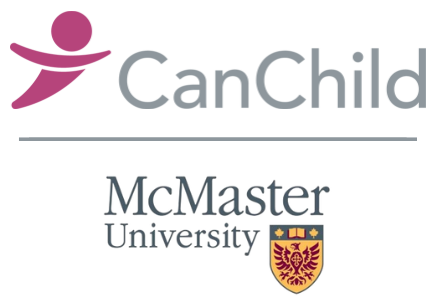Parent Resources
Partnering with Families of Children with Cerebral Palsy
Checking Up and Checking In: Partnering with Families of Children with Cerebral Palsy
A video inspired by parent members of the On Track study team and funded by PCORI.
Creating the Future: Engaging Children with Cerebral Palsy in the Circle of Care
A video inspired by parent members of the On Track study team and funded by PCORI.
EXCITING NEWS! A two part article authored by parent members of the On Track Study Team is published in eParent Magazine.
Part 1 Bringing the Families Voice to Research: Parents as Members of the Research Team
Part 2 Bringing the Family's Voice to Research: How Families Contribute to Research
Parent to Parent Articles written by parents for parents
Parent to Parent articles are helpful resources written by the Parent Investigators in the On Track Study. New articles will be posted as they are available.
- Therapy in Natural Environments by Kimberly Rayfield (English) (French) (Spanish)
- Learning to Transition by Marquitha Gilbert (English) (French) (Spanish)
- Talking with Others about Your Child and CP by Barbara Sieck Taylor and Paula Drew (English) (French) (Spanish)
- Bringing the Family's Voice to Research by the On Track Study Parent Researchers (English) (French) (Spanish)
For more useful tips like these on the CanChild website, see Tips FOR parents of children and youth with cerebral palsy, FROM parents (English)
RESOURCES FOR CHILDREN AND FAMILIES
- Plain Language Summary of Results - Final Report to Parents English Spanish
- Video Summary of Results - Watch here
Newsletters
On Track Study Family Newsletter, First Edition, March 2014 (English) (Spanish)
On Track Study Family Newsletter, Second Edition, September 2014 (English) (Spanish)
On Track Study Family Newsletter, Third Edition, June 2015 (English) (Spanish)
On Track Study Family Newsletter, Fourth Edition, May 2016 (English) (Spanish)
On Track Study Family Newsletter, Fifth Edition, January 2017 (English) (Spanish)
People involved in research studies sometimes wonder why they don't get more information about 'how they did' in the tests or assessments that the researchers do. We thought it might be helpful to explain why this is so.
When people visit a doctor or therapist we expect to receive individual attention! This means that the questions that are asked, the information provided, and the recommendations made are all done for that specific purpose and for that specific person.
On the other hand, in a research study we try to ask everyone the same questions, so we can gather "standardized" information. This allows us to look for patterns in the information when we put it all together at the end of the period of study. That way we can hopefully make some general comments about what we are studying. For this reason, the On Track Study Assessor's role is not to provide feedback about each child and family's assessments, or to offer advice about therapy.
Involving families in the research process is an important goal of this project. Within a few months of each study visit, families participating in the study will be sent a summary report explaining the results of testing for their child. (See Parent Feedback Forms below)
Family Feedback Forms
After each study visit, parents will receive individualized feedback with a summary of their child's scores in Balance, Strength, Range of Motion, Endurance, Overall health, Participation in Family and Recreational Activities and Self-Care Activities. This report allows us to give families some immediate, brief feedback about the visits. However, more detailed results will be available at the end of the study once we have completed all the visits over time for the large group of children in the study.
Parents are encouraged to share the feedback forms with the child's treating therapist(s) to help therapists consider how child, family, and service factors interact when planning interventions and evaluating outcomes. The intent is to facilitate this exchange between families and therapists to broaden the focus of rehabilitation services for young children with CP to include not only development of motor abilities but also comprehensive interventions and supports to enhance participation in daily activities and routines.
